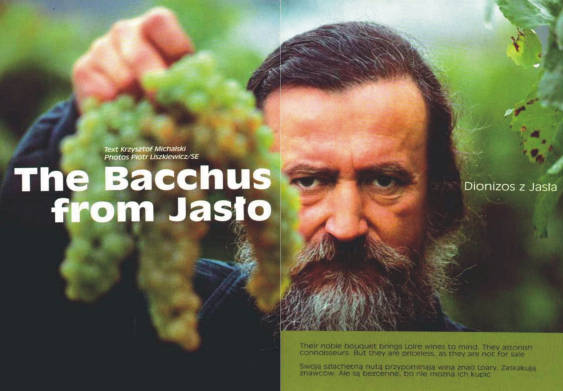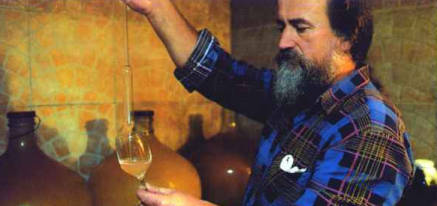
The Bacchus from Jaslo
Their noble bouquet brings Loire wines to mind. They astonish connoisseurs. But they are priceless, as they are not for sale.
 Polish wine experts, regular faces at world wine festiv als, spare no compliments for the vintages produced by Roman Mysliwiec. "The taste is astonishing! But then enthusiasts' wines must have an interesting taste. He's a professional!" says Krzysztof Kowalski, journalist at the daily Rzeczpospolita and an expert on wine.
Polish wine experts, regular faces at world wine festiv als, spare no compliments for the vintages produced by Roman Mysliwiec. "The taste is astonishing! But then enthusiasts' wines must have an interesting taste. He's a professional!" says Krzysztof Kowalski, journalist at the daily Rzeczpospolita and an expert on wine.For others, the wine of Roman Mysliwiec is clear, noble and recognisable. He is more and more often talked about as the 'first pro fessional wine producer in Poland', or simply the 'Bacchus of Jaslo.' But this nickname annoys 52-year old Roman Mysliwiec. "They might make jokes about me, but I take wine seriously!" he says in defence, though the more annoyed he gets the more he's like the god of wine and pleasure: long, dishevelled hair, and a bushy beard. There's no mistaking him, its Bacchus all right!
Vines grow in even rows on the southern slopes of the mountains surrounding Jaslo in southeast Poland. The 'Golesz' vineyard (named after the ruins of a legendary castle nearby) has four thousand vines in two hectares; a veritable kingdom of Bacchus, setting the rhythm of his life for the last twenty years. From spring he tends the crop, harvest the grapes in September, and then shuts himself away in the cellar.
"The wine is still fermenting in October, I can hear it seething and rumbling. And it warms up as well!" Roman could go on about wine for hours: how he sets it, pours it, clarifies it... in a word how he gives wine its ultimate flavour in the quiet of his cool vinery. And the effects of his research into wine have been surprising the experts for some time now.
Everything is done in line with recipes which have not changed for thousands of years. That is why Nicolas Joly, the French producer of Culee Serrant wine, recognised worldwide as the 'Pope' of biodynamic vine cultivation (using no unneces sary chemicals), will probably invite the Bacchus of Jaslo to join the World Association of Biodynamic Wine Producers. The most incredible thing then would be that Roman Mysliwiec, though in such exulted company, would at the same time be unable to sell a single bottle of his wine in his own country. And that's be cause after World War II vineyards making wine since the 14th century (some better, some worse) finally vanished from Po land's landscape. Together with the vineyards, regulation; allowing producers such as the Bacchus of Jaslo to sell home made wine also ceased to exist.
"I planted my first vine by the arbour twenty years ago," he says, walking around his vineyards. "Three years later the vim bore fruit beautifully. I planted more vines, and thought it migh be my way of making a living."
Before then, as a keen mountaineer, he had for many year been making a living out of working at dangerous heights.
Hungarian wine-growing friends planted the first serious number of vines, and Roman learnt the secrets of cultivation from Slovakian and Russian handbooks.
So far 200 of the world's major vine varieties have passed through the hands of Bacchus. He experiments, grafts, harvests the fruit from September to October, makes the wine, and tastes and compares it. Today he knows the best grape varieties for wine production in Poland. Good types for white wine are Seyval Blanc, Bianca, Odessa Muscat, Sibera, Hibernal, Aurora and Jutrzenka. For red he recommends Rondo and Cherry Rannyj. He is testing more vines, and knows almost everything about them.
Last September he received a prestigious award from the In ternational Institute for Promoting Wine and Wine-making in Paris for his book 101 varieties of vine to cultivate in Poland. Today Roman is making a living through his passion for his family, a wife and two growing children. Saplings from his plantation are eagerly sought-after all over Poland. He travels the country teaching others how to set up vineyards, and is helping to revive wine-making traditions. But he is cautious in assessing his own wines: "They still need to be worked on for a long time. They are a long way from being great wines."
He calls himself a self-taught amateur. Others call him a professional!
 His cellar has a mill for crushing fruit, presses brought over from the Czech Moravia, hoses, pipes, funnels, and corking machines. A sour smell of wine hangs in the air. There's a tiny laboratory in the corridor to the left. At the end, behind a heavy door, is the most important: an even row of light amber and dark purple demijohns, full. Some translucent, already cleared, others still fermenting. Three steel vats of table wine. The Golesz vineyard produces 3,000 litres of wine a year!
His cellar has a mill for crushing fruit, presses brought over from the Czech Moravia, hoses, pipes, funnels, and corking machines. A sour smell of wine hangs in the air. There's a tiny laboratory in the corridor to the left. At the end, behind a heavy door, is the most important: an even row of light amber and dark purple demijohns, full. Some translucent, already cleared, others still fermenting. Three steel vats of table wine. The Golesz vineyard produces 3,000 litres of wine a year!"With sweet wines one can hide imperfections by adding sugar; that's why I make dry wines," explains Roman Mysliwiec. He leaves the best wines untouched throughout the winter.
"I have iron rules," he explains. "They will reach maturity in summer, that's when they taste best."
A year ago, participants at the first wine-tasting event at the Golesz vineyard included Marek Bienczyk, novelist, translator, and wine columnist, and Wojciech Bohkowski, a musicologist. Both are wine-tasting experts, and go to the world's top wine festivals. The first served was 'Seyval Blanc', then the 'Bianca'...
"Clear, noble, and individual. Getting better from year to year. They could become class wines. Obviously, for climatic reasons, one cannot expect exceptional wines to be made in Poland," adds Marek Bienczyk cautiously. But there is no doubt that Roman's best wines beat Bulgarian wines hands down in individuality and grace, and are far ahead of ordinary Bordeaux. They resemble wines from the Loire valley or Austria. At a time when most of the world's wines are becoming similar in taste, the best ones from Jaslo are distinctive and have character: a fine taste, acidity and dryness. It is as if the Bacchus of Jaslo has achieved a spicy mineral flavour by disolving stones in them.
"Of course they are not perfect. But these wines are simply tasty!" argues Wojciech Bohkowski. "Excellent for oysters, mussels, and crab, and at the same time suitable for traditional Polish cuisine, such as pork dishes or ravioli."
Roman Mysliwiec did not rest on his laurels, and soon afterwards presented his 'Rondo' red. Bonkowski called it a revelation, and said it could end up on European tables.
Some wine lovers have resorted to underhand methods just to try the produce of the Golesz vineyards. A certain lady pretended to be a journalist wanting an interview. Someone wanted to start a vineyard but preferred checking beforehand if it was worth doing.
Others claim to be friends of friends... And all just to sample the famous but still unobtainable wines.
"And just imagine, it could be that I arrive in sunny Galicia, southern Poland, and at an inn in Jaslo I would order a carafe of the local wine to go with my meal for six zlotys," muses Krzysztof Kowalski of Rzeczpospolita. Then he gets annoyed: "But, for now anyway, one has to drink some imported 'rotgut' or other with the meal."
This should be about to change. Roman Mysliwiec is involved in creating a wine-making bill that would permit people like himself to sell wines legally in their own homes. It could also be a chance for Polish agriculture in the Podkarpacie province, as well as a way forward for the revival of wine-making traditions in Poland. Members of parliament in Poland's Sejm should be finalising the details of a bill soon. The sooner it is passed the better!
Krzysztof Mlchalski
ph. Piotr Liszkiewicz
Kaleidoscope XI 2002
ph. Piotr Liszkiewicz
Kaleidoscope XI 2002

